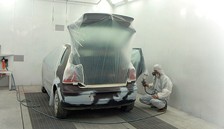Paint manufacturers have responded to growing demand for products which increase bodyshops’ productivity with a number of new launches.
Many of these also fulfil another requirement as the industry becomes more aware of its impact on the environment – quicker-acting products which reduce energy usage.
BASF has recently launched three products under its R-M and Glasurit brands to target both these areas.
Speedflash S (R-M) is a quick-drying thinner and performance enhancer for R-M’s clear lacquers and has a curing time of 10 minutes if baked at 60°C and – according to BASF – replaces a standard thinner. Its ability to work quickly should mean vehicles spend less time in the oven, thus increasing productivity and reducing the amount of energy used.
The product is compatible with R-M’s clear coat called Chronolux CP, introduced about 18 months ago, which dries in 10 minutes at 60°C.
Another item which cuts baking time by BASF – under its Glasurit brand – is HS Racing Clear. The product is ready to polish in 10 to 15 minutes if baked at 60°C. BASF says it is ideally suited to minor damage and for component parts.
Colin Drain, technical sales support manager for BASF, says: “All the products we are developing are to reduce the process time to improve efficiency and take into account the environmental costs.
“If you are baking in 10 minutes or at a lower temperature, your energy use and carbon footprint goes down.”
Optimal profitability
Anthony Cashel, DuPont Refinish brand manager for UK and Ireland, says body-shops can benefit from working with their paint provider to improve productivity and reach optimal profitability.
For its ValueShade technology, DuPont Refinish developed seven shades of grey undercoats that support every topcoat colour in its range.
Like BASF, DuPont Refinish has also put extra focus on speeding up the drying process. Its Ultra Productive VOC Clear 3750S clearcoat can be used for repairs on large areas in
conjunction with its XK203 and XK206 activators.
“This offers bodyshops an option to decrease the amount of inventory they hold, reduce energy consumption and, of course, offer faster repairs to their customers,” says a spokesman.
No heat required
Ultra Violet (UV) technology continues to make strides in helping body repairers cut their cycle times and energy costs.
“No heat is required to cure Sikkens Autoclear UV, and with a drying time of just six minutes, it’s a hugely efficient product,” says Akzo Nobel, marketing manager Ed Hilborne.
“We see this as a big growth area, and will be introducing a UV primer in 2009 to offer bodyshops further reductions to process times.”
Higher utility prices are affecting all businesses, and inefficient processes can cost the bodyshop more in energy bills by requiring excessive drying times. Fast-drying products, together with energy-efficient equipment, are helping increase throughput and achieve better profits.
Self-repairing paint
Touching up minor scratches on cars could soon become a thing of the past, thanks to a paint which heals itself.
Scientists Marek Urban and Biswajit Ghosh, from the University of Southern Mississippi in America, announced the discovery last month.
The polymeric material is able to repair itself after being exposed to the sun.
It consists of a network of ring-shaped molecules known as oxetanes, which split open when damaged, exposing two reactive ends.
When these are exposed to ultraviolet light from the sun, a chemical reaction allows a material called chitosan, a substance found in the shells of crabs and shrimps, to repair the broken rings.
The compound was tested using a razor-blade-thin scratch.
However, the polymer can repair itself in the same spot only once.
In 2005, Nissan developed the Scratch Shield coat which ‘repairs’ slightly-damaged paint within a week.
Pouring warm water on the area accelerates the process.
It is offered in the UK on the niche Nissan Murano premium SUV, launched last year.
Nissan GB says all Murano customers have taken it.
Smart repairs
Dealerships could be missing an upsell opportunity by not offering a smart repair service which essentially fixes small dents and scratches without respraying the whole vehicle.
Colin Drain, technical sales support manager at BASF, says dealerships’ bodyshops have the capability to do this type of repair and need to publicise this.
When a vehicle comes into the workshop, ideally an estimator should assess the vehicle to see if there is an opportunity to offer the customer a spot repair. Drain says it could work well if offered alongside a car’s service as the vehicle will be in the workshop anyway.
Manheim’s figures which show the amount it is charged for smart repair costs show refurbish for a single alloy wheel is £58, a windscreen chip is £42, coloured bumpers can be repaired for £53, minor scratches polished out for £17 per panel and interior trim repaired from £53.













Login to comment
Comments
No comments have been made yet.